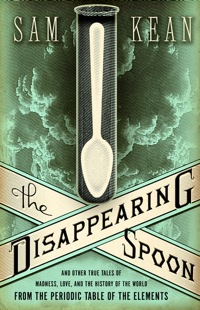 Of the dozens of books I’ve read this year, The Disappearing Spoon: And Other True Tales of Madness, Love, and the History of the World from the Periodic Table of the Elements by Sam Kean is my easily my favourite. It was very fun to read, accessible, and written with a refreshing cleverness that was just the right balance of information and fun. It would be an understatement to say I learned a lot and not hyperbole to say I had a great time doing it.
Of the dozens of books I’ve read this year, The Disappearing Spoon: And Other True Tales of Madness, Love, and the History of the World from the Periodic Table of the Elements by Sam Kean is my easily my favourite. It was very fun to read, accessible, and written with a refreshing cleverness that was just the right balance of information and fun. It would be an understatement to say I learned a lot and not hyperbole to say I had a great time doing it.
At it’s core, The Disappearing Spoon is a science history book about chemistry, the periodic table. It feels terribly unfair to reduce the book to something that sounds so dry, but there it is.
Keans introduces us to every element on the periodic table. The goal is obviously to get us to appreciate every single one, so he emphasises what makes it special or interesting. Sometimes we learn how or where it was discovered or by whom, but sometimes it focuses entirely on why it is unique and what it can do. If that element made an impact on our world, physically, culturally, economically… we learn how and why, and we learn to love it in the same way the author does.
The book is not consistent with what we learn for every element — some things get multiple pages while others just a short blurb — but that’s okay because we’re getting the fascinating stuff. Most of the elements get their own time in the spotlight, while a few are discussed along with their close chemical relatives.
This is a hard book to write about without writing too much or too little. It’s hard to choose a few highlights to share without neglecting things that probably deserve attention. But if you want to learn about Tycho Brahe’s prosthetic nose, or how silicon revolutionised computers, about crazy poisons or wild drugs, explosions, Fauste, weapon technology, black holes, people turning blue, homemade nuclear reactors, why Americans drop the ‘i’ from ‘aluminium’, other bizarre stories, this book will have something for you.
I’ve already found myself repeating the amusing anecdotes or information from the book to people. Twice I insisted on reading a passage to someone I know would appreciate a tale within. For a book that is intended to be very limited in scope, you will learn about so much beyond the periodic table. I was just so excited about it that it was impossible not to want to share things; this book will boost your trivia knowledge, but it also might make you the obnoxious know-it-all at parties.
To my chagrin, I was unenthusiastic about reading The Disappearing Spoon initially since a book about the periodic table doesn’t exactly sound like a rip-roaring adventure. Even when I did finally order it, it sat around on my Kindle for six months before I finally gave it a go. It makes me a little sad to admit that if so many people hadn’t raved about it, I never would have read it at all. I am so glad I gave this book a chance, and I hope you will too.
